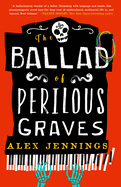
Alex Jennings offers readers a fantastical, musical imagining of New Orleans in The Ballad of Perilous Graves, as three children are tasked with saving the city they love after the nine songs that keep it thriving are stolen by an evil power.
In this dreamlike place--not truly New Orleans, but Nola--live Perilous "Perry" Graves; his sister, Brendy; and Peaches, his best friend (and adolescent crush), who lives across the street in an abandoned house she's filled with animals. These three are tasked by a haint named Doctor Professor (a nod to the notable New Orleans blues artist Professor Longhair) to save the city by rescuing nine threatened songs that form the heartbeat of Nola.
This quest morphs into a twisted, dark adventure, complete with dips into alternate realities, embodied songs that walk and talk, and a terrifying villain who will stop at nothing to squash the heart of the city in which he is entrapped.
The premise of The Ballad of Perilous Graves is as simple and as complicated as that, offering space for Jennings to build out a world that is at once deeply rooted in New Orleans history ("this is a jazz city through and through!") and entirely steeped in imagination. Residents drop everything and dance on the hoods of their cars whenever Doctor Professor appears with his magical piano and starts playing in the streets; graffiti walk out of murals and into the air, followed by packs of Paintbodies (something akin to groupies) seeking out the contact high these painted figures offer; zombie-like characters drive cabs over to the Dead Side of Town and no one blinks an eye. Perhaps most importantly, songs in this world are living, breathing things, as capable of being murdered at point-blank range as they are of inspiring a crowded dance hall with their musical abilities. "That's the thing about music," explains Perry's grandfather. "It can destroy as much as it creates. It's wild and powerful, dig?"
There's a moment near the middle of The Ballad of Perilous Graves when a person is trying to retrieve something from a locked car during a flooding storm. In struggling to get into the car, he recalls a quote about walking in the rain, "Something about how when sudden showers blow up, people run, take cover, trying to avoid getting wet, got wet anyhow. But if one were to resolve from the beginning to just be soaked, perplexity would evaporate." While it's a small moment in the novel's plot arc, this line proves key to unlocking the mastery across the pages of Jennings's debut novel. The more a reader can let go of expectations and just fall into the strangeness of the story of Perry and his friends, the less perplexing it becomes, as the incredible, rich, vivid world of magical and musical Nola emerges.
The intersection and overlap of that magic and music sing across every page of The Ballad of Perilous Graves, both literally and figuratively, as Perry, Brendy and Peaches come to understand the magic of music and the music of magic. "Thass magic baby, pure and simple," crows the ghost of Doctor Professor to the three. "Jazz, baby... Potentest sorcery in all of Nola." As they come to appreciate both their own powers and those that run through the city on their quest to save the nine songs that make Nola what it is, they encounter music at every turn: in jazz clubs and dance halls, in the streets and at home, in their memories and the future city they want to not just rescue, but build. Jennings draws on the rich musical traditions of New Orleans throughout, with references to artists and songs pivotal to the city's music history.
The Ballad of Perilous Graves is in no way a children's story, though the three unlikely protectors in this story are children, tasked with saving their city when the adults around them are unable or uninterested in doing so. The themes underlying Jennings's incredible worldbuilding are ones of darkness and deceit, desperation and determination. The disconnect between the ages of the protagonists and the trials they must face, however, feels intentional throughout. It's an invitation to readers to see the world of possibilities as a child might, and to acknowledge the complexities inherent within those possibilities. That's the magic of the music in Jennings's stunning novel. It's an ode to a city, to an art form, to an age--all wrapped up in a surreal work of speculative fiction that introduces readers to an entirely new and complex society while simultaneously inviting a re-introduction to the world as we (think we) know it. --Kerry McHugh

